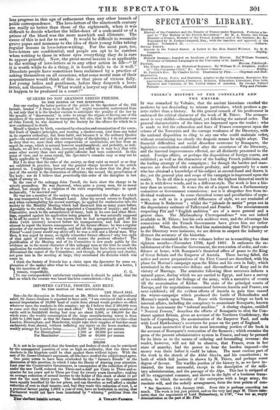QUAKERS DO NOT ABANDON ERRING FRIENDS. TO THE EDITOR OF
THE SPECTATOR.
Any one reading the latter portion of the article in the Spectator of the 22d instant, headed "-A Dress to be Hanged in," might reasonably understand from it, not only that it is the Quaker custom to anticipate the penalty of the law by the penalty of "disownment," in order to escape the stigma of having one of the members of the society hung or transported, but also, that in the particular case of John Tawell, he was disowned by the Society for the offence for which he is now condemned to death.
Myself a Quaker by birth, convinced by education and examination of the essen- tial truth of Quaker principles, and wearing a Quaker-coat, (not from any belief in its superior orthodoxy, but from habit, and because it is the ordinary Quaker garb—the external and only the external badge of discipleship,) I do not pretend to deny that we, more than other corporations or associations, are free from an .esprit du corps' which is natural however unphilosophical; and probably, as indi- viduals, we all feel a rising wish, (cowardly and selhsh as it may be,) that with some other society than ours any public offender had been connected. In this point of view, and to some extent, the Spectator's remarks may or may not be fairly applicable to "Friends." But I do deny that the rules of the society, as they exist on record or as they are exhibited in practice, bear out the general charge involved in the article referred to. I might bring forward many of its rates to show that the first ob- ject of the society is the restoration of offenders; the second, the preservation of the body: nor do I believe that practically this order of the discipline is lost eight of among us. In the case of the unhappy John Tawell, the facts show the charge to be utterly groundless. He was disowned, when quite a young man, for no moral offence but simply for a violation of the rules respecting marriage: to speak technically, "he married out." He was not a member of the society when he committed the offence for which he was transported to Van Dieman's Laud. After his second return to England, and when contemplating his second marriage he applied for readmission into the -society to the Monthly Meeting which had 'disowned him so many years before. Agreeably to the rules, the Meeting appointed a Committee of inquiry; and that Committee, much to the astonishment of many, both in its own and other Meet- ings, repated against his application being granted. He was naturally suppm-ed tole all he seemed to be: it was known that he had scrupulously paid all his debts (with interest) incurred before his transportation and had done his utmost to repair the known conseq.uences of his former offence: he was a regular offender of our meetings for worship, and had all the appearance of a" consistent Friend "—and (some would say above all) he was a rich and a liberal man. Why then, it was urged by many, so rigidly remember former offences? why lose sight of that spirit of. meekness which would restore the penitent offender The justification of the Meeting and of its Committee is now made public by the evidence as to the moral character of this unhappy man at the time he made the application for readmission: for it was no old offence but facts then recent which determined the report of the Committee; and though, for propriety and charity, not gone into in the meeting at large, they occasioned the decision which was come to.
I think the Society of Friends has a claim upon the Spectator for some ex- planation of the matter after what he has written; and, in default of a better, I the insertion of this.
remain, respectfully, C. G. [To our correspondent's satisfactory explanation it should be added, that the fact on which the censure was based has been contradicted.—ED.]


























 Previous page
Previous page